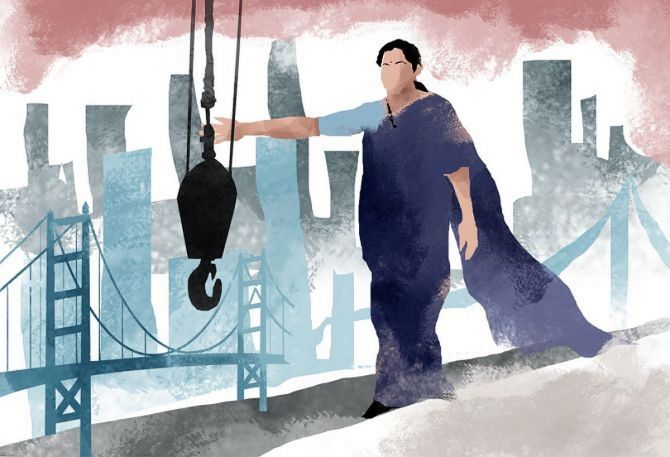For development finance institution to succeed now, the government must stand like a rock behind it and be patient.
Anup Roy, Nikunj Ohri & Abhijit Lele report.

The government has gone back to the drawing board with its new development finance institution (DFI), learning from recent experience to include control mechanisms and safeguards.
India’s DFI model worked till the economic liberalisation of the early nineties forced them to fend for themselves.
For such an institution to succeed now, the government must stand like a rock behind it and be patient, said experts and bankers who have spent their careers engaged in infrastructure funding.
The National Bank for Financing Infrastructure and Development Bill, 2021, tabled by Union Finance Minister Nirmala Sitharaman recently, seemed to be promising to do so even as it is keen to merge or privatise the banks it owns.
The DFI business is tricky.
It must lend long term — for 30 years or more — for greenfield and brownfield projects that have an uncertain future and cash flow.
But the current money market is such that except for the sovereign, few projects can expect to raise bonds for that long.
Plus investors are unlikely to lend money when it comes to the infamous gridlock of infrastructure without sovereign guarantees.
That is precisely what the government has promised to do this time.
Three of India’s old-generation DFIs were converted to banks later on.
People who were engaged with the DFIs, both in their original form and as banks, said the primary reason those DFIs failed was that the government became unwilling to support it after financial sector reforms.
The Industrial Finance Corporation of India (IFCI), India’s first DFI floated in 1948, converted from a statutory corporation to a company in 1993.
Industrial Credit and Investment Corporation of India (ICICI), set up in 1955, merged with ICICI Bank in May 2002.
The Industrial Development Bank of India (IDBI) converted into a bank in October 2004.
One of the many financial institutions floated for development needs in 1997, IDFC Ltd, also converted into a bank in 2015.
The only true capital infrastructure-focused DFI still in existence is India Infrastructure Finance Co Ltd (IIFCL), which started in January 2006.
As of March 2020, IIFCL’s gross non-performing assets (NPAs) were at nearly 20 per cent, and the provision coverage ratio at 50 per cent only.
About 55 per cent of its portfolio is concentrated on power and road projects.
It is unclear whether the new DFI will start its life after merging IIFCL with itself.
If that happens, the operations will start with legacy-impaired assets.
Historically, DFIs could tap into the long-term operation funds from the Reserve Bank of India (RBI) at concessional rates.
Funding also came from multilateral and bilateral agencies, guaranteed by the government.
DFI bonds were eligible to be counted as banks’ statutory liquidity ratio (SLR) requirement, which gave them access to a steady stream of cheap funding.
Following the Narasimham Committee’s first report in 1991, the government and the RBI withdrew the SLR status of the bonds and told the DFIs to compete with others to raise funds.
The cost of funds skyrocketed just as bad debts were piling up, and there was virtually no market for long-term corporate bonds.
The DFI Bill shows that the government has reintroduced a preferential cheap funding window with the RBI for the new DFI.
The DFI can now borrow from the “RBI against bills of exchange or promissory notes arising out of bona fide commercial or trade transactions maturing within five years from the date of the borrowing”.
Madan Sabnavis, chief economist at CARE Ratings, said the liquidity window will help the DFI manage its cash flows, especially in the short to medium term.
Since the long-term borrowing cost for a DFI is high, the liquidity window will help soften the overall cost.
The DFI will get government guarantees for its repayment, and support through grants or contributions in the form of cash or marketable government securities.
The government will infuse Rs 5,000 crore into it through cash or government securities in the first year of incorporation.
The government’s equity contribution of Rs 20,000 crore should enable the DFI to raise Rs 3 trillion.
The operations would get preferential tax treatment.
According to a government official who spoke on condition of anonymity, setting up the DFI will help in making long-term investments available for long-gestation infrastructure projects, especially the Rs 111 trillion National Infrastructure Pipeline.
The failure of infrastructure finance companies can also be systemically catastrophic, as was evident when IL&FS went belly up in 2018, forcing the government to intervene.
“The government seemed to have learnt its lessons from that crisis well.
"There is ample scope for the DFI to address its asset-liability mismatches through long-term bond issuance supported by a government guarantee, or through takeout financing mode.
"If the underlying asset performs, there will be many takers," said Ashvin Parekh, managing partner of Ashvin Parekh Advisory Services LLP.
Bankers, however, say it is equally important that a professionally run DFI does not stay away from projects that are crucial for the country but may not seem initially viable.
B K Batra, former deputy managing director of IDBI Bank, who was part of the erstwhile IDBI, said, “An unambiguous government support in the form of sovereign guarantee, income tax holiday, forex hedging, the upfront grant would help lower the cost of funds for the upcoming DFI.”
“With government guarantee, if the bonds can have SLR status once again, the new DFI will never have to worry about cheap funds.
"On top of that if the DFI is allowed to issue tax-free bonds, then it can tap into the virtually inexhaustible domestic savings,” said a former bank chairman, who is now engaged with a large infrastructure finance company.
But Batra added that autonomous board functioning with market-linked compensation and freedom to hire and fire (including for the managing director and deputy managing directors) was critical, too.
One major recommendation in the Bill is that the investigative agencies won’t unduly harass the management for business decisions gone wrong.
“No investigation agency shall conduct any enquiry or inquiry or investigation into any offence alleged to have been committed under any law, in relation to any recommendation made or decision taken by the Chairperson or other directors, employees or officers of the Institution in discharge of his official functions or duties,” the Bill said.
The probe can be done only after government consents.
“This would lift the sword of fear from such decision-making.
"Credit decisions need to be taken in a thoroughly professional manner, without any kind of fear or favour," Batra said.
According to Parekh, at some point, there should be a mechanism so that if a state cannot fulfil its commitment, the project becomes the asset of the state and gets removed from the DFI book.
The Centre, in turn, can adjust payments made to states on account of goods and services tax (GST).
“This can actually be a game-changer and prompt the states from doing their part in a faster manner,” he added.











